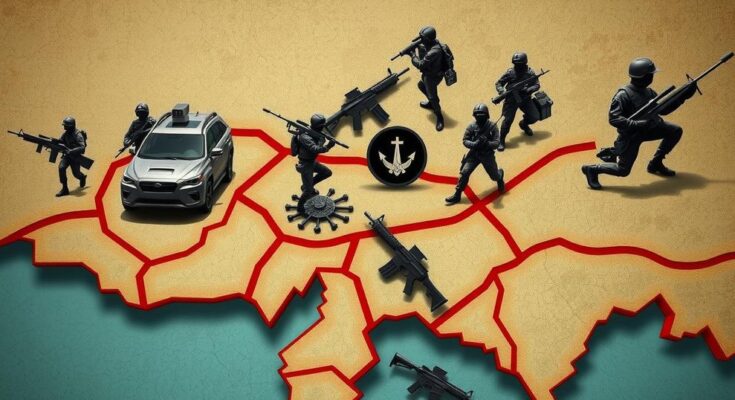Rwandan troops are reportedly preparing to invade the DRC to assist M23 rebels in capturing Goma. Skirmishes with Congolese forces are ongoing and civilians face dire humanitarian conditions. The UN Security Council is due to meet urgently to address the crisis amid increased military presence from Rwanda and concerns about further territorial ambitions.
Reports indicate that substantial numbers of Rwandan troops are infiltrating the Democratic Republic of the Congo (DRC), supporting rebel forces aiming to seize Goma, the regional capital. Intelligence officials suggest that the Rwandan Defense Force (RDF) has covertly crossed the border and positioned themselves near Goma, primed for an invasion. Senior RDF commanders are reportedly stationed in Gisenyi, a city adjacent to Goma, indicating increased military readiness.
Ongoing skirmishes between the M23 militia and Congolese forces have escalated dangerously close to Goma’s outskirts. Tragically, three South African peacekeepers lost their lives while attempting to defend this pivotal city. The conflict is intensifying, with frontline movements threatening to breach Goma’s perimeter. Congolese sources claimed that an attempted major offensive by M23 forces was thwarted overnight, but tensions remain high.
The urgency of the situation is underscored by an upcoming emergency meeting of the UN Security Council (UNSC) to address the crisis. Observers believe that Rwanda seeks to solidify control over Goma before the international community can effectively respond. Following the last M23 takeover of Goma in 2012, Congo was supported by international pressure which forced Rwandan forces to withdraw. This time, however, it is anticipated that Rwanda aims for an expedited takeover, capitalizing on the insurgents’ advances.
Intelligence suggests that up to 4,000 RDF troops were already operating in DRC prior to the recent influx. Moreover, reports indicate Rwanda’s ambitions may extend beyond Goma to include the city of Bukavu, further exacerbating regional instability. The ongoing M23 insurgency has broadened its territorial control, with the group recently capturing key towns that threaten vital supply routes leading into Goma.
Humanitarian conditions in Goma are reported to be dire, with shortages of water and power amidst ongoing conflict. “Given the huge number of civilians currently seeking shelter in Goma, it is vital that pressure be mounted on all parties to protect civilians and civilian infrastructure such as hospitals, and allow access to vital humanitarian aid,” stated Clémentine de Montjoye from Human Rights Watch. The inadequacy of the West’s response to support for President Kagame’s regime in Rwanda has drawn significant criticism.
In response to escalating tensions, the European Union has articulated a clear stance, calling for Rwanda to halt its support for the M23 and withdraw its forces from DRC. The Rwandan government, however, maintains its position of non-involvement with the rebel group, providing no comment upon publication. The situation in the DRC remains precarious, with the potential for further conflict looming.
The ongoing crisis in DRC, intensified by M23’s insurgency, poses a significant threat to regional stability. The M23 group has been involved in violent conflicts, gaining control over strategic areas in eastern DRC rich in minerals. The renewed advances by Rwandan troops into DRC, allegedly to support the M23, have raised alarms as international entities prepare to address the situation. The history of Rwanda’s influence in the DRC has left deep-rooted concerns regarding sovereignty and humanitarian impact, highlighting the complex interplay of regional politics.
The situation surrounding the impending Rwandan military action to assist M23 in their attempt to capture Goma is increasingly alarming. With potential ramifications for regional stability and humanitarian crises, international bodies, including the United Nations and European Union, must respond effectively to the evolving threats. Continued military aggression in the DRC may ultimately exacerbate conflicts and lead to further displacement of civilians in the already volatile region.
Original Source: www.theguardian.com




